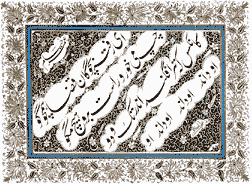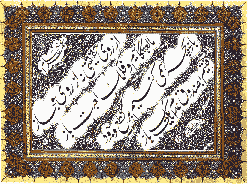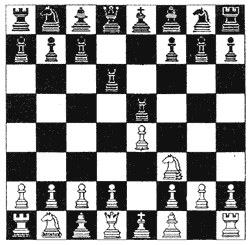| A Game of Chess or a Game of Chance!

(click
to enlarge) |

(click to enlarge) |
'The Ball no question makes of Ayes and
Noes
But Here or There as strikes the Player goes;
And He that toss'd you down into the Field,
He knows about it all—HE knows—HE knows!' 1 |
'But helpless Pieces of the Game He plays
Upon this Chequer-board of Night and Days;
Hither and thither moves, and checks, and slays,
And one by one back in the Closet lays.' 2 |
 ISUALIZE the drama of life and death as staged, act by act, from the beginning of evolution to the present time. As the curtain lifts, does it lift from the vision of a mindless universe endlessly engaged in the casting of dice, or does it lift from a completely different scenario? The drama, it should be noted, remains the same, as also the actors who play their part. The vision alters only in relation to the viewer. If the viewer sees it through the coloured glass of deep-seated, preconceived, atheistic prejudices then of course he will view nothing but chaos wedded to chaos, giving birth to a brood of meticulously shaped and well-disciplined offspring. This happens generation after generation after generation. Each generation invariably recedes yet again into a world of utter chaos, continuously giving birth to order and discipline without exception, without fail. So the drama of evolution moves on from chaos to order without an orderly disciplined mind to command it. Despite this, however, order always emerges out of disorder, until man the masterpiece of evolution is created—the ultimate child of compounded chaos and confusion. ISUALIZE the drama of life and death as staged, act by act, from the beginning of evolution to the present time. As the curtain lifts, does it lift from the vision of a mindless universe endlessly engaged in the casting of dice, or does it lift from a completely different scenario? The drama, it should be noted, remains the same, as also the actors who play their part. The vision alters only in relation to the viewer. If the viewer sees it through the coloured glass of deep-seated, preconceived, atheistic prejudices then of course he will view nothing but chaos wedded to chaos, giving birth to a brood of meticulously shaped and well-disciplined offspring. This happens generation after generation after generation. Each generation invariably recedes yet again into a world of utter chaos, continuously giving birth to order and discipline without exception, without fail. So the drama of evolution moves on from chaos to order without an orderly disciplined mind to command it. Despite this, however, order always emerges out of disorder, until man the masterpiece of evolution is created—the ultimate child of compounded chaos and confusion.
If, on the other hand the viewer is an unbiased observer of what he sees and permits his vision to be led to whichever direction the scheme of creation leads him, then of course the same drama will take on a completely different complexion. At each replication of life into more complex and more organized entities of higher order and at each step forward on the evolutionary journey, he will perceive the guiding hand of the Supreme Creator. If the former scenario can be likened to a game of roulette, the latter perhaps would be more aptly described as a game of chess where every pawn, king, queen, bishop, castle etc., is moved by the hand of a Prime Mover. Evidently the perplexities and the problems that we are discussing can only be resolved if the invisible hand of a Conscious All-Wise Operator is contemplated to be at play. As if an astoundingly vast chequer-board of chess were spread out from end to end over the entire expanse of the globe, over dry land and water, over hills and dales, over highs and lows; such is the vastness of the arena in which countless actors played the drama of the synthesis of life from nothingness. All they had to work on was a state of stark death which prevailed over the entire planet Earth some 4.5 billion years ago.  AS IT REALLY a game of chess being played with a Prime Mover representing order, wisdom, design, foresight, command and patience on the one hand and vast limitless chaos on the other? Or was it a mere game of roulette contested between chaos on the one hand and chaos on the other? An all-encompassing confusion of the grandest scale was locked in a battle of life and death with its opposite number, a vast unruly disorder blowing across the face of earth in every direction from AS IT REALLY a game of chess being played with a Prime Mover representing order, wisdom, design, foresight, command and patience on the one hand and vast limitless chaos on the other? Or was it a mere game of roulette contested between chaos on the one hand and chaos on the other? An all-encompassing confusion of the grandest scale was locked in a battle of life and death with its opposite number, a vast unruly disorder blowing across the face of earth in every direction from

every direction. There were no rules of the game, no purpose, no set design, yet it was hoped without awareness by the mindless cosmos that neither of the giants of chaos would win. Both would end up in mutual destruction or commit suicide in utter frustration, hopelessness, despondency and despair. A grandiose display of hara-kiri indeed! For the proponents of chaos versus chaos giving birth to a child of perfect order, it is here in hara-kiri perhaps that the solution lies. This is the only advanced mathematical absurdity which they can think of to advocate their cause. What homage to the goddess of chaos by her devotees! Evidently if chaos is destroyed at the hand of chaos or through an act of self-demolition, whatever is left is either nothing or order. Hence no dilemma, no riddle, no mystery is left to be resolved. Good riddance!
So far in the previous discussions we have attempted to draw some logically inevitable conclusions. But in the final analysis it is after all no more than the word of an outsider against the word of a constellation of eminent secular scholars. To lend our inferences some additional support, we have decided to bring this subject to a close by quoting some competent scientists who had to confess that the only solution to the problem of creation lies in the admission that there does exist a Supreme Creator. It was He who created options at every creative step and it was He Himself who selected the right option to usher the creation into a higher order of existence. Hence, stage after stage it was He who made choices with purpose, design and direction. Frank Allen, Professor of Biophysics, University of Manitoba, Canada and recipient of the Tory Gold Medal, Royal Society of Canada writes: 'The adjustments of the earth for life are far too numerous to be accounted for by chance.' 3 What he evidently means is that in the long journey of evolution we find design, order and harmony which cannot be ascribed to chance. Commenting on the complexity of proteins and the manner in which they play the essential role of building, supporting and advancing life, Allen categorically rejects the idea of attributing this to chance. Also for a single protein molecule to be formed out of chance would require 10248 years! As far as the known span of evolution is concerned, for it to accommodate all the figures as have been mentioned, is as impossible as impossible can be. All the amazing steps of creation only took 4.5 billion years! Scientists conduct their experiments in precisely controlled laboratory conditions. A chance spillage or leakage would ruin an experiment; the apparatus would have to be reorganized, and the experiment repeated in order to negate the effects of the mistake. A conscious mind has to supervise what is going on and make sure nothing goes wrong by chance. The conditions prevailing at the time of some of the major stages in evolution were far from favourable. It has in fact been described by John Horgan that: '... life evolved and survived under unpleasant—and periodically even hellish-circumstances.' 4 For special favourable conditions to prevail uninterrupted over an exceptionally long period of time is not by itself sufficient to evolve and fix a new character in the evolving species. Time is not a creator; it is just a neutral span, like a vast cauldron, in which any constructive or destructive interaction takes place. If different elements are shoved into a cauldron haphazardly without purpose or design, time by itself, however long, cannot organize ingredients into any meaningful product.  CIENTISTS who try to simulate the creative phenomenon in nature, in carefully controlled laboratory conditions, fully realize that the whole process has to be precisely monitored and guided step after step to achieve the intended purpose. Yet they are frustrated despite the fact that the entire exercise is pre-planned and consciously masterminded by highly knowledgeable scientists. Leave the laboratory at the mercy of time alone and return to it after a lapse of some fifty or more years and observe the disorder time created and the ruin to which it has led whatever it comprised. CIENTISTS who try to simulate the creative phenomenon in nature, in carefully controlled laboratory conditions, fully realize that the whole process has to be precisely monitored and guided step after step to achieve the intended purpose. Yet they are frustrated despite the fact that the entire exercise is pre-planned and consciously masterminded by highly knowledgeable scientists. Leave the laboratory at the mercy of time alone and return to it after a lapse of some fifty or more years and observe the disorder time created and the ruin to which it has led whatever it comprised.
Given time, order turns into chaos if no countermeasures are consciously designed to protect it. William Krantz, Kevin J. Gleason and Nelson Caine in their article, Patterned Ground write: 'Order in nature would appear to be the exception, not the rule. The regularity of the solar system, the complex organization of living things and the lattice of a crystal are all transient patterns in a grand dissolution into chaos. The prevailing theme of the universe is one of increasing entropy. All the more wondrous, then, are the examples of order in nature.' 5 There are many other scientists who having pondered over the issue of the origin of creation and of life in relation to time and chance, have drawn the inevitable conclusion that there has to be an Omniscient, Omnipotent, Omnipresent Supreme Intelligence to design, organize and govern creative phenomena. Without Him, the beginning of creation and evolution of life are mathematically inconceivable. Horgan in his article In the Beginning quotes Crick's observation: 'The origin of life appears to be almost a miracle, so many are the conditions which have had to be satisfied to get it going.' 6 But why 'almost' one may ask, it is indeed a miracle! Horgan goes on to say: 'Some scientists have argued that, given enough time, even apparently miraculous events become possible— such as the spontaneous emergence of a single-cell organism from the random couplings of chemicals.' 7 But how many chances of random couplings would be needed for the creation of life is the very question which has been answered by Fred Hoyle, the renowned British astronomer, in the following words: '... such an occurrence is about as likely as the assemblage of a 747 by a tornado whirling through a junkyard.' 7 Professor Edwin Conklin, an eminent biologist at Princeton University, puts it like this: 'The probability of life originating from accident is comparable to the probability of the Unabridged Dictionary resulting from an explosion in a printing shop.' 8 Dr. Winchester, another great biologist, admitted that: '. . . after many years of study and work in the fields of science, my faith in God, rather than being shaken, has become much stronger and acquired a firmer foundation than heretofore. Science brings about an insight into the majesty and omnipotence of the Supreme Being which grows stronger with each new discovery.' 9 The time scale required for evolution, if haphazard blind brainless chance were to be its creator, is so enormously large that it boggles the mind of even the most expert mathematician. No human expression can describe it, no human mind can grasp the immensity of the figures involved. As mentioned earlier, Allen estimated the time needed for the chance synthesis of the complex proteins to be 10248 years. The entire span of evolution however requires a much larger slice of time than the mere production of proteins to which Allen refers. To help the unfamiliar reader visualize this mathematical concept, we would like to remind him that the total age of the universe since the Big Bang is only eighteen to twenty billion years. No name has been ever invented or will ever be invented to denote the astronomical figure Professor Frank Allen has worked out. Perhaps eternity is the nearest name to it.  O CUT A LONG STORY SHORT, we request the reader to realize that even if the creation of the universe and the subsequent evolution of life had actually started a trillion multiplied by a trillion years ago, it would still be mathematically impossible for evolution to reach the stage of man. O CUT A LONG STORY SHORT, we request the reader to realize that even if the creation of the universe and the subsequent evolution of life had actually started a trillion multiplied by a trillion years ago, it would still be mathematically impossible for evolution to reach the stage of man.
This simply means that both the author of this treatise and the reader who is holding this book in his hand, are neither here nor there. The pen shall never be created nor the hand which holds it. The eye that reads it and the mind that struggles to grasp what the pen has drawn have not even been conceived by the blind creator—chance. Who am I, O reader, and who are you? What is the quarrel about? Let us slump into a restful slumber until that remote time when mindless, sightless chance would have consummated the plan of evolution that it never conceived. For each chance step that it will take in the right direction, it will have to blunder into millions upon millions of steps in the wrong direction. But by that time, alas, entropy would have left nothing of the universe to evolve into anything, nor of the blind creator itself. Chance will cease to play any role whatsoever in the inert state of an all-pervading death. The figure 10248 is most certainly larger than the time needed for entropy to finish off everything. Evidently it takes a very determined person who is otherwise sane to believe in such insanity. Yet many sane, highly intellectual scientists do believe in it. Their case is like that of a religious fanatic, who in ordinary affairs of life appears quite normal, but when it comes to matters of faith and belief, shuts himself off completely from the light of rationality and common sense into a cocoon of mindless prejudice. It is amazing how the human mind is capable of withdrawing itself into a midsummer night's dream in broad daylight. Perhaps it is more realistic to say that he continues to live in two different worlds of reality and fantasy simultaneously. Only death can liberate man from his bondage to a life of make-believe.
REFERENCES - HERON-ALLEN, E. (1899) Edward Fitzgeralds Rubâiyat of 'Omar Khayyam. H.S. Nicholas Ltd., London, p.104
- HERON-ALLEN, E. (1899) Edward Fitzgeralds Rubâiyat of 'Omar Khayyam. H.S. Nicholas Ltd., London, p.102
- ALLEN, F. (1968). The Origin of The World—By Chance or Design? In: The Evidence of God in An Expanding Universe, by Monsma, J.C. Thomas Samuel Publishers, Bombay, p.20
- HORGAN, J. (February, 1991) In the Beginning. Scientific American: p.121
- KRANTZ, W.B., GLEASON, K.J., CAINE, N. (1988) Patterned Ground. Scientific American: p.68
- HORGAN, J. (February, 1991) In the Beginning. Scientific American: p.125
- HORGAN, J. (February, 1991) In the Beginning. Scientific American: p.118
- KORNTELD, E.C. (1968) God—Alpha and Omega. In: The Evidence of God in An Expanding Universe, by Monsma, J.C. Thomas Samuel Publishers, Bombay, p.174
- WINCHESTER, A.M. (1968) Science Undergirded my Faith. In: The Evidence of God in An Expanding Universe, by Monsma, J.C. Thomas Samuel Publishers, Bombay, p.165
|